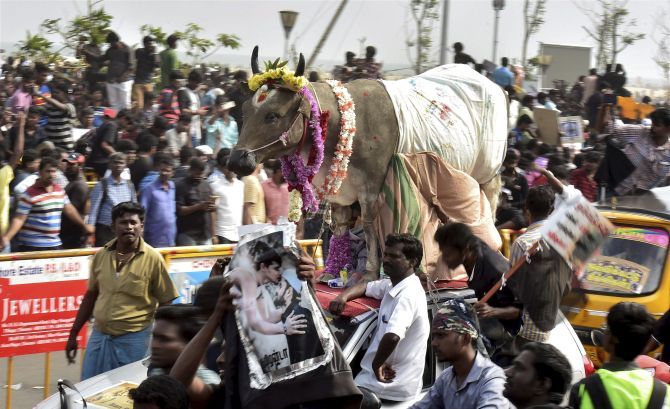 | « Back to article | Print this article |
'The BJP is so keen to use this opportunity to make its foray in a state where it hardly exists, says Amulya Ganguli, that it has silenced the vociferous animal rights activist in its ranks -- Maneka Gandhi.'

History of a somewhat dubious kind was made in Tamil Nadu when the state legislature approved of an amendment of the Prevention of Cruelty to Animals Act.
Where the normal expectation is an initiative in favour of strengthening the provisions to eliminate egregious brutality, there has been a dilution -- undoubtedly an unprecedented event in the history of such conscience-driven measures.
Yet, arguably, the step is not all that unusual.
That the law itself is no more than half-a-century old underlines the newness of the concept of animal rights.
Evidently, the idea did not -- and probably still doesn't -- have wide acceptance and may also be regarded as the sign of too delicate a mentality.
Such an outlook is not surprising since the muteness of animals has been their curse since the dawn of history where humans are concerned.
As the proverbial beasts of burden, they were -- and still are -- worked to death. Or were hunted (sometimes to extinction) to provide food or as a 'sport'.
As in the case of outlawing slavery, it took a few high-minded individuals to initiate steps to prevent gratuitous cruelty towards animals.
Even then, the punishment for breaking the law has rarely been substantial enough to be a genuine deterrent.
Now that a step backwards has been taken in Tamil Nadu, the possibility of further regression cannot be ruled out.
Already, there are indications that the revival of other 'sports' involving animals like buffalo racing in Karnataka or cockfights in Andhra Pradesh are being contemplated in defiance of judicial orders.
That the Bharatiya Janata Party is ready to jump in on the side of these upholders of cultural and traditional fun and games is not surprising.
The reason is that, for one thing, animal rights is seen as a Western concept by the saffron brotherhood -- so is human rights where Islamic terrorists are concerned, but that is another story -- and, for another, the BJP has seen its support for Jallikattu as a means of securing a foothold in Tamil Nadu politics which is currently in a flux after J Jayalalitha's death.
The BJP is so keen to use this opportunity to make its foray in a state where the party hardly exists because of its association with North India that it has silenced the vociferous animal rights activist in its ranks -- Maneka Gandhi.
Besides, the BJP's reverence for culture and the consequent disavowal of judicial diktats in the matter have been seen from the time of the Ram Janambhoomi movement in the 1990s when its leaders claimed that the courts could have no say in questions of faith.
The party was so adamant about this line of separation between religion and the judiciary that the UP chief minister of the time, Kalyan Singh, wore the broad smile of a valiant warrior for his incarceration for a day for having failed to abide by the judicial order to save the 16th century protected monument of the Babri Masjid from the depredations of Hindutva storm-troopers.
Where Tamil Nadu is concerned, the defiance of the Supreme Court over Jallikattu is not the first time that the state has given full play to its self image as a special, even unique, entity.
One of the first instances of this attitude was evident in the movement for a 'sovereign' Dravida Nadu led by, among others, the DMK's C N Annadurai, who spoke in favour of 'self-determination' for Dravidians in a speech in the Rajya Sabha in 1962.
Three years later, the anti-Hindi agitation once again emphasised Tamil Nadu's distinctiveness even if it had the positive fallout of marginalising Hindi zealots.
However, the outlook of being in a category of its own with not much in common with the rest of the country was also evident in the cold reception which the DMK gave to troops of the Indian Peace-Keeping Force returning from Sri Lanka in 1990.
It would have been better, however, if the state had chosen something other than the 'sport' of bull-taming to assert its cultural pride, for the event can lead to the deaths of participants, as in Puddukkottai, and of a policeman in Virudhunagar over the past few days.
The outbreak of violence in Chennai over the demand for the perpetuation of the sport irrespective of what the judiciary or the animal rights activists of PETA (People for the Ethical Treatment of Animals) and the Animal Welfare Board say also shows how the issue can play into the hands of trouble-makers while the champions of Jallikattu focus on the cultural aspects.
Amulya Ganguli is a writer on current affairs.